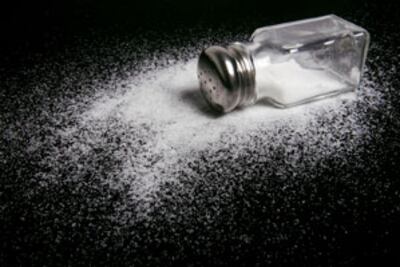People who add extra salt to their food at the table are at higher risk of premature death from any cause, according to a study.
The research, involving more than 500,000 people, found that those who always add salt to their food are at a 28 per cent greater risk than those who never or rarely add it.
Generally, about three in every 100 people aged 40 to 69 die prematurely in the general population.
Now, the latest calculations for the study, published in the European Heart Journal, suggest that one extra person in every 100 who adds salt to their food may die early.
The researchers also calculated how many years the extra salt-eaters knocked off their lives compared with those who did not add salt.
At the age of 50, 1.5 years and 2.28 years were knocked off the life expectancy of women and men, respectively, who always added salt to their food.
“We need some salt in our diet, but eating too much may lead to high blood pressure, which in turn raises the risk of heart attack and stroke,” said Chloe MacArthur, senior cardiac nurse at the British Heart Foundation.
“While it is always important for people to be careful about adding too much salt to food, the vast majority of salt is already in food before we buy it, which means we are consuming more than we realise.
“This is why it is important for the government to look at ways to encourage the food industry to reduce the amount of salt it puts in food, such as the salt levy recommended in Henry Dimbleby’s National Food Strategy.”

The new study was led by Lu Qi, of Tulane University School of Public Health and Tropical Medicine in New Orleans in the US, with colleagues from Harvard medical schools.
“Even a modest reduction in sodium intake, by adding less or no salt to food at the table, is likely to result in substantial health benefits, especially when it is achieved in the general population,” he said.
Prof Qi decided to look at adding salt at the table because assessing overall salt intake is difficult given the high levels of salt in many foods, including processed foods.
“Adding salt to foods at the table is a common eating behaviour that is directly related to an individual’s long-term preference for salty-tasting foods and habitual salt intake,” he said.
“In the western diet, adding salt at the table accounts for 6 per cent to 20 per cent of total salt intake and provides a unique way to evaluate the association between habitual sodium intake and the risk of death.”
The experts analysed data from 501,379 people taking part in the UK Biobank study.
When joining the study between 2006 and 2010, people were asked, using a touchscreen questionnaire, how often they added salt to their foods with the options of never/rarely, sometimes, usually or always.
Factors that may influence the results were accounted for, such as age, sex, race, deprivation, body mass index (BMI), smoking, alcohol intake, physical activity, diet and medical conditions such as diabetes, cancer and heart disease.
During a typical nine-year follow-up, some 18,474 premature deaths (under the age of 75) were recorded.
The researchers found that the risks of early death linked to adding salt were reduced slightly in people who ate the most fruit and vegetables, although these results were not statistically significant.
“We were not surprised by this finding as fruits and vegetables are major sources of potassium, which has protective effects and is associated with a lower risk of premature death,” Prof Qi said.
“Because our study is the first to report a relation between adding salt to foods and mortality, further studies are needed to validate the findings before making recommendations.”


